By Claire Bacon, ACN, CNC
What Is Glutathione?
There’s a lot of buzz in the natural health world about glutathione, so you may be wondering what it is. As the body’s “Master Antioxidant”, glutathione plays a key role in our health. It’s a substance that supports our well-being, cellular repair and maintenance and overall toxicity level. As such, we should pay attention if our desire is to be healthy!
Specifically, Glutathione is a tripeptide consisting of glutamine, cysteine and glycine. It helps to prevent damage to our cells brought on by reactive oxygen species (ROS) such as free radicals and peroxides.
Glutathione exists in two forms: reduced and oxidized. In its reduced form, glutathione passes through our cells gathering up toxins and free radicals, excreting them from the body. Once this action is performed, the glutathione becomes oxidized. Unlike other antioxidants (like vitamins A, C, and E), oxidized glutathione can be recycled through the methylation process. However, many of us do not methylate well, and miss out on our full potential to experience the benefits of glutathione.
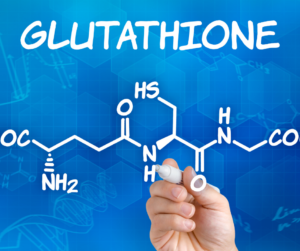
Benefits of Glutathione
- Anti-Aging – The primary cause of aging is free radical accumulation and oxidative stress. Improving your glutathione levels can help reduce the visible signs of excess free radicals (lack of collagen, wrinkles, etc.). And it can help repair the damage caused by years of free radical accumulation.
- Anti-Inflammatory – Supplementing glutathione levels can help repair the damage caused by inflammation and can combat the root cause of the inflammation. This makes it one of the most beneficial antioxidants to supplement for prevention of virtually every health condition.
- Athletic Performance and Recovery – Glutathione can help improve muscular strength, stamina and tissue recovery. Exercise is part of a healthy lifestyle, but it can also cause harm through oxidative damage. Studies have shown that oxidized glutathione levels rise by as much as 320% during bouts of intense exercise.
- Brain Health – The brain is particularly vulnerable to oxidative damage due to its enormous oxygen use. This oxidative damage impacts our neurons, leading to mitochondrial dysfunction and neurodegenerative diseases. Repairing this oxidative damage is one of the roles glutathione plays in the body, helping to prevent neurological disorders through the natural aging process.
- Liver Health and Detoxification – The liver is the most important organ when it comes to detoxifying our body and regulating immunity. Therefore, it has the highest concentration of glutathione in the body. Increasing glutathione levels promotes detoxification and reduces stress on the liver. This can prevent chronic inflammation, which can lead to fatty liver disease and cirrhosis of the liver.
And there’s even More…
- Energy Production & Cellular Metabolism – The mitochondria are responsible for producing energy within our cells. Mitochondria produce adenosine triphosphate (ATP) and also play a role in cell signaling, cell death and cell growth. Improving the health and quality of our mitochondria helps prevent any anomalies from becoming widespread.
- Skin Health – The body’s first line of defense against exogenous toxins and infections is the skin. This is why our skin holds such a huge concentration of antioxidants, combating potential infections before they enter the body. Supporting antioxidant levels can help improve this ability, as well as improve skin quality and appearance.
- Immune Health – The immune system is a complex system of numerous antioxidants, cells and processes that protect our body from infection, disease and illness. No single piece is more important than glutathione when it comes to our immune function. Glutathione enhances the function of natural killer cells and T cells, essential for the body’s response to infection.
- DNA Repair – Glutathione is directly and indirectly involved in the repair, expression and synthesis of our DNA. It is so important to ensure our DNA is healthy because it tells our cells how to develop. If this process is functions improperly it can lead to the proliferation of numerous diseases and cellular dysfunctions.
Top Threats to Optimal Glutathione
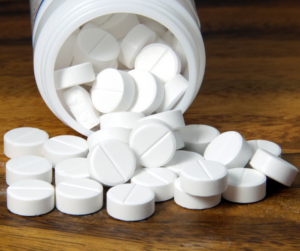
- Chemical exposures to toxins can impair the way our cell membranes work. It’s like throwing a monkey wrench into our natural growth and repair processes.
- Excess exercise can also wreck our health. Yes, you can have too much of a good thing! Exercise produces free radicals as a normal metabolic byproduct. If the cleanup work doesn’t happen sufficiently, you can wind up promoting aging instead of the youthfulness you’re pursuing.
- Acetaminophen is the active ingredient in Tylenol. Unfortunately, it’s associated with sudden liver failure, due to its detrimental effect on glutathione synthesis in the liver. It’s terribly ironic (and dangerous) that most Americans view Tylenol as a safe choice when an adverse reaction, infection, or injury occurs. It’s not! In a time of crisis, you need MORE glutathione, not less!
Foods to Improve Glutathione Levels
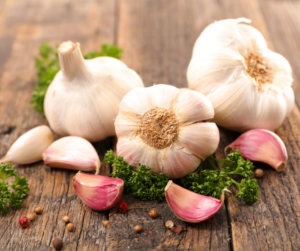
Sulfur-rich foods – like garlic, onions, and cruciferous vegetables (broccoli, cauliflower, cabbage, kale, etc.).
Undenatured Whey Protein – it will say “undenatured” whey on the label, which means minimally processed. Dr. Mercola sells an undenatured whey, and the Standard Process original SP Complete is also undenatured whey.
Raw Milk and Raw Eggs – are great sources of amino acid building blocks that are used in glutathione production. It must be raw, though! High heat damages the proteins used in this process.
Turmeric contains powerful antioxidant phytochemicals. You’ll typically find recipes using this spice in delicious Indian and Thai dishes.
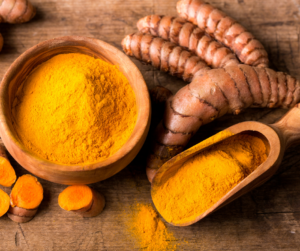
Supplements to Support Glutathione Production
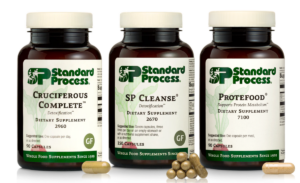
SP Cleanse contains 20+ different foods and herbs to promote various liver functions. It’s featured in our 10-Day and 21-Day Cleanses, which work to help cleanse and regenerate the body due to its improved glutathione production.
N-Acetyl Cysteine (NAC) is a precursor nutrient to the body’s natural production of glutathione. You can take it as a stand-alone supplement. It’s extremely effective in emergency room settings when someone has had an excess intake of Acetaminophen. It has been extremely helpful to recover patients from Covid infections, too. Unfortunately, the FDA is looking to call NAC a drug, and wants to remove it from health food store shelves. Pay attention! We need to fight to keep NAC accessible to all!
Cruciferous Complete is a blend of two well-known cruciferous vegetables – just like it sounds! It contains kale and Brussels sprouts – good sources of sulfur and vitamin K1 to promote healthy blood clotting and heart health. If you don’t eat it, take it!
Alpha Lipoic Acid has a multitude of uses in the body. It’s one of our favorites for promoting liver function and relieving excess glycogen storage (fatty liver).
Selenium is a companion nutrient to Vitamin E. It is most commonly found in Brazil nuts.
B Vitamins (especially folate and B12) are involved in the methylation process, where glutathione is recycled.
Protefood contains the amino acid Lycine, along with vitamin C and glutamic acid. These nutrients are useful in the recycling process and creation of glutathione.
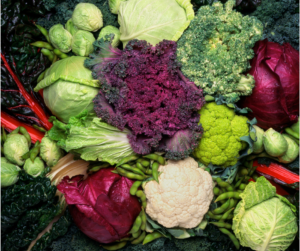
Final Thoughts on Glutathione
It’s an unusual word, somewhat “sciency”, and not the easiest process to understand. However, once you get the idea that glutathione is underlying all the good things you want for your body, you’ll realize how important it is!
Try a few of these easy steps to get your liver working and reducing those free radical species. You’ll be glad you did!


